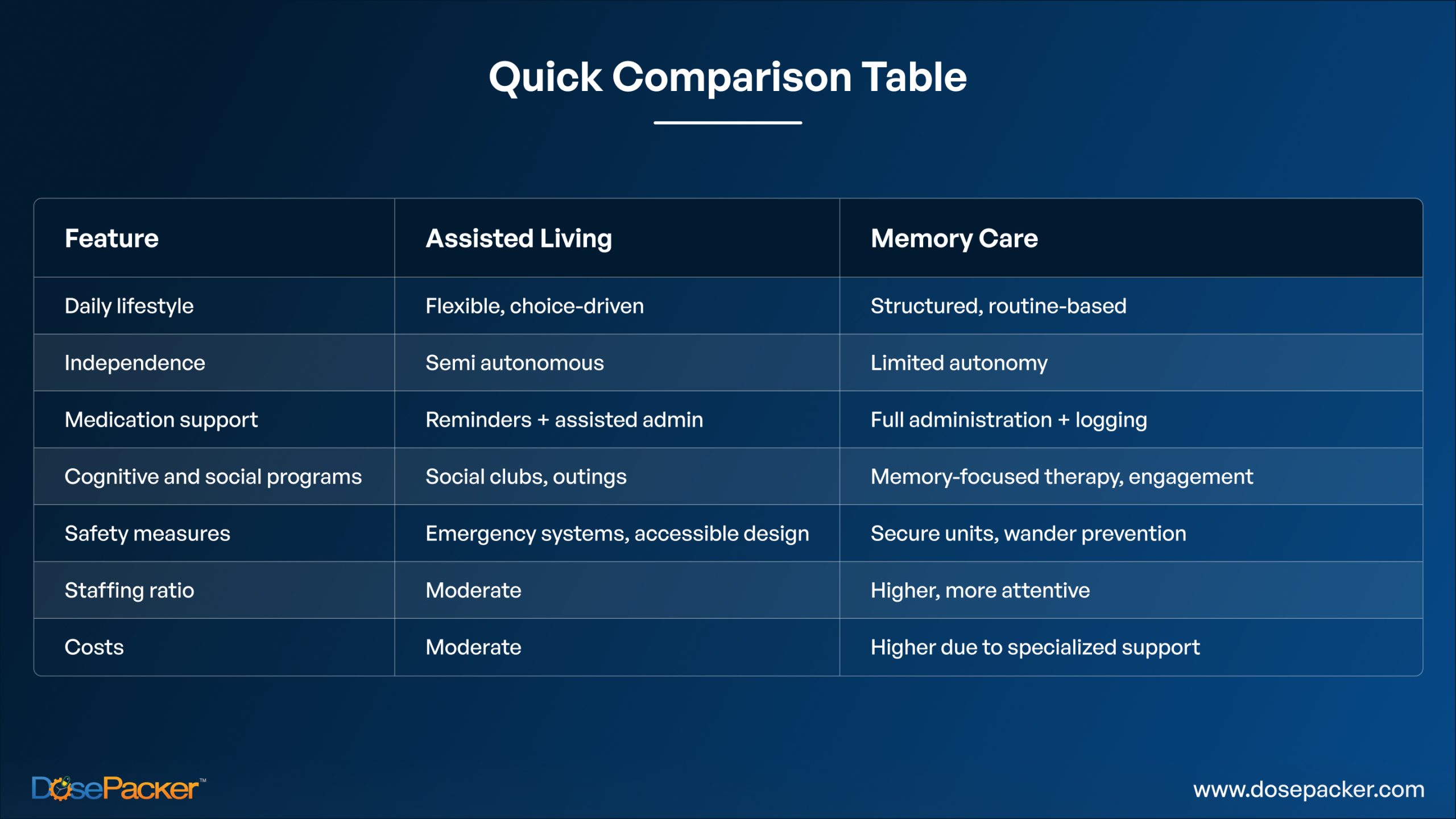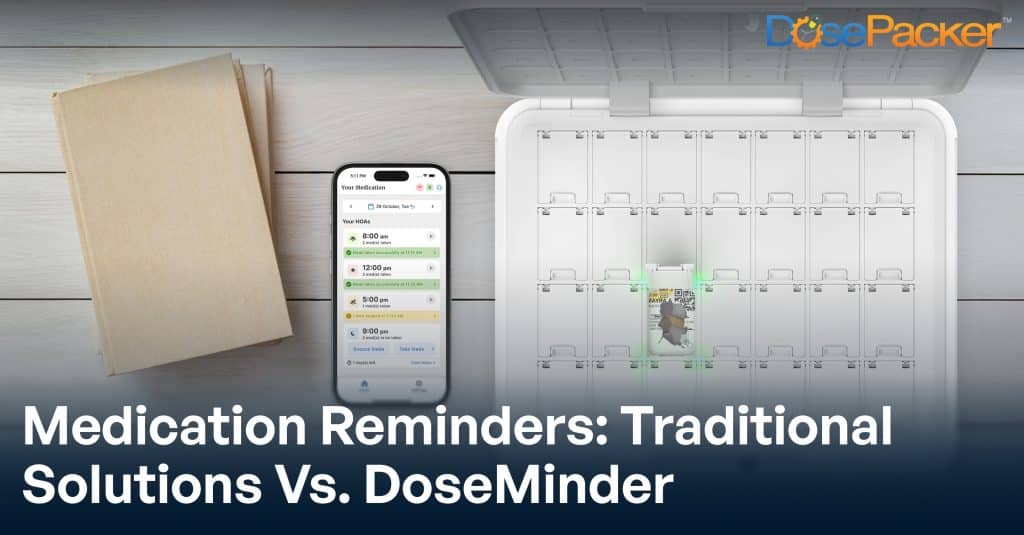Unlock the latest in medication management technology and grow your care community with us.

When your loved one starts drifting from routine moments, forgetting appointments, getting lost on familiar routes, it can feel like pieces of their life are quietly slipping away. You may find yourself asking, “What is assisted living?” and “What is the difference between assisted living and memory care?”, wondering which option will best honor their dignity, safety, and everyday needs.
Recent studies reveal that nearly 60% of residents in assisted living facilities move to a memory care or skilled nursing facility within two years, a decision not to be taken lightly, yet one that is common among families navigating changing care needs.
In this guide, we’ll break down the differences between assisted living and memory care facility environments, clarify who each is intended for, and explore how care technology, such as that offered by DosePacker, plays a role in supporting both.
What Is Assisted Living?
Assisted living is ideal for older adults who are mostly independent but require assistance with day-to-day tasks, such as bathing, dressing, medication management, or housekeeping. These communities strike a balance between freedom and support, offering:
- Private or semi-private apartments
- Communal dining and social activities
- Assistance with personal care routines
- Medication reminders or basic health services
In short, assisted living is designed for individuals who require some assistance but do not require full-time medical supervision.
What Is Memory Care?
Memory care, on the other hand, is a specialized type of long-term care focused on residents with Alzheimer’s disease, dementia, or other cognitive conditions. These communities are built for safety, comfort, and familiarity.
Key features include:
- 24/7 supervision by dementia-trained staff
- Secured environments to prevent wandering
- Therapies designed for memory retention
- Structured routines to reduce confusion
So, memory care versus assisted living isn’t just about having more staff; it’s about a completely tailored approach to cognitive challenges.
What Is Memory Care vs Assisted Living: Who Needs What?
It’s natural for families to delay moving a loved one to memory care. After all, assisted living can support residents with early-stage dementia. But as cognitive decline progresses, the risks grow.
Ask yourself:
- Is your loved one forgetting meals or medication even with reminders?
- Do they seem confused about time or place?
- Have they wandered or shown signs of aggressive behavior?
These are signs it might be time to explore memory care options. In contrast, if your loved one simply needs physical help but their memory is still sharp, assisted living might still be the better fit.
Staff Expertise & Environment: A Key Difference
One of the most defining differences between assisted living and memory care facility settings is the level of staff training.
Memory care teams receive specialized instruction in dementia behavior management, redirection techniques, and non-verbal communication.
In assisted living, staff may not have the same depth of training, though they provide compassionate support for physical needs.
The environments also differ: memory care units are often smaller and feature secured entrances, motion sensors, and clear, guided hallways. Assisted living offers safety, too, with features such as handrails, emergency buttons, and well-lit corridors, but people come and go more freely.
Reflect on your loved one’s daily risk: if safe independence is possible, assisted living may be ideal. If needs lean toward constant support, memory care provides peace of mind.
Medication Management in Both Settings
One of the most significant distinctions between memory care and assisted living is how medication is managed. In assisted living, caregivers offer gentle reminders and provide assistance with self-administration. In memory care, management is more active – medication is tracked, administered, and logged daily, with secure storage and regular oversight.
Mistakes in med-pass processes are surprisingly common and can be dangerous. That’s why tools like DosePacker’s medication management solutions support both environments by automating med-packs, time-stamping dosage, and syncing to digital records, reducing errors and freeing space for compassion.
By simplifying the process, caregivers can spend more time with residents, and families can feel more confident about the care being delivered.
Cost & Coverage: What To Expect
Memory care typically costs more, reflecting the need for round-the-clock supervision and specialized programming. Assisted living is often more cost-effective initially, but may require transitions as needs evolve.
When comparing assisted living vs memory care facility costs, consider:
- Base living expenses
- Level of clinical and cognitive support
- Insurance or Medicaid coverage
- Likelihood of needing future transitions
Planning early helps families feel financially and emotionally prepared.
Here’s a quick look:
Factors |
Assisted Living |
Memory Care |
|
Avg. Monthly Cost (US)
|
||
|
Staff Training
|
General caregiving support |
Dementia specific training |
|
Environment
|
Home-like, less structured |
Secured, predictable, cognitively safe |
|
Medication Management
|
Scheduled reminders |
Supervised with strict adherence |
|
Ideal For
|
Seniors needing help with daily tasks |
Seniors with Alzheimer’s/dementia |
Discover the key differences between Assisted Living and Skilled Nursing Facilities in our blog post on Assisted Living vs Skilled Nursing Facilities.
Engagement and Emotional Well-Being in Both Settings
Assisted living encourages diverse social engagement through activities such as book clubs, fitness classes, and casual gatherings, keeping life vibrant.
Memory care focuses on emotional enrichment, structured activities, music and art therapy, and sensory garden time, all tailored to residents’ cognitive abilities. This helps reduce anxiety and improve mood in meaningful ways.
Making the Transition: When Is The Right Time?
Sometimes, a resident in assisted living may need to transition to a memory care facility. This shift doesn’t have to be sudden or traumatic. The key is to observe changes early, particularly in behavior, confusion, and safety awareness.
Facilities that offer both care levels under one roof (also known as continuum of care campuses) can make this transition much smoother, with familiar surroundings and staff.
Comparing Assisted Living and Memory Care

Asking the Right Questions: What to Look For in a Care Facility!
Choosing between assisted living and memory care is a big decision, and touring facilities can be overwhelming. Asking the right questions helps you see beyond brochures and truly understand how a community operates on a daily basis. It ensures that your loved one will receive not just adequate support, but care that’s thoughtful, safe, and aligned with their evolving needs.
Here are some essential questions to ask when evaluating a facility:
- How is medication managed, especially for memory-challenged residents?
- Do you offer specialized memory engagement programming?
- What security and wander prevention measures are in place?
- Can residents easily transition from assisted to memory care, if needed?
- Is there a centralized system (like DosePacker) for tracking medications and care?
These questions help clarify real concerns and enable you to make an informed decision.
Final Thoughts: Choosing with Compassion!
The decision between assisted living vs memory care is never black and white. It’s deeply personal and often emotional. What matters most is understanding the unique needs of your loved one, being honest about what support they need today, and staying prepared for what tomorrow might bring.
Assisted living fosters independence with gentle support. Memory care provides protection, structure, and cognitive-specific care. With smart tools like those from DosePacker, both environments can enhance medication safety, provide peace of mind, and support improved outcomes.
Families who choose thoughtfully often find environments that not only meet needs but also enrich later life. With planning and purpose, assisted living can be a home, and memory care can be a place to thrive!
So, whether you’re planning ahead or making decisions in the moment, know that you’re not alone. With the right resources, you can find a place where your loved one continues to live well, fully supported, and deeply respected.
To see how DosePacker elevates care facilities with smart solutions, contact us today!
































